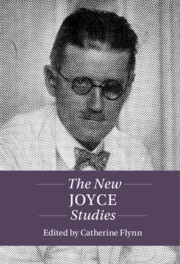Book contents
- The New Joyce Studies
- Twenty-First-Century Critical Revisions
- The New Joyce Studies
- Copyright page
- Contents
- Figures
- Notes on Contributors
- Acknowledgments
- Abbreviations
- Introduction
- Part I Scope
- Chapter 1 The Transcripts of (Post)Colonial Modernity in Ulysses and Accra
- Chapter 2 Joyce and Race in the Twenty-First Century
- Chapter 3 Dubliners and French Naturalism
- Chapter 4 Joyce and Latin American Literature Minor Transnationalism and Modernist Form
- Chapter 5 The Multiplications of Translation
- Chapter 6 The Joycean Public Domain and the Shape of Freedom
- Chapter 7 Ulysses in the World
- Part II Fragment and Frame
- Part III Perspective
- Bibliography
- Index
Chapter 6 - The Joycean Public Domain and the Shape of Freedom
from Part I - Scope
Published online by Cambridge University Press: 01 September 2022
- The New Joyce Studies
- Twenty-First-Century Critical Revisions
- The New Joyce Studies
- Copyright page
- Contents
- Figures
- Notes on Contributors
- Acknowledgments
- Abbreviations
- Introduction
- Part I Scope
- Chapter 1 The Transcripts of (Post)Colonial Modernity in Ulysses and Accra
- Chapter 2 Joyce and Race in the Twenty-First Century
- Chapter 3 Dubliners and French Naturalism
- Chapter 4 Joyce and Latin American Literature Minor Transnationalism and Modernist Form
- Chapter 5 The Multiplications of Translation
- Chapter 6 The Joycean Public Domain and the Shape of Freedom
- Chapter 7 Ulysses in the World
- Part II Fragment and Frame
- Part III Perspective
- Bibliography
- Index
Summary
Using Joyce’s oeuvre as a sample case, Robert Spoo’s chapterenvisions a new global commons.From James Joyce’s lawsuit against Samuel Roth in 1927 to the decisions in the case between Carol Schloss and the Joyce Estate in 2000s, Joyce has served as the exemplar of issues around copyright in modernist literature. Following his recent history of American protectionist copyright law and public domain, Spoo first maps out the new possibilities for critical readings and publication following the passage of Joyce’s works into the public domain, following the expiration of copyright in most European Union countries on January 1, 2012. He will then sketch the recently emerged contradictions of international public domain. In response to this situation, which he calls “tragedy of the uncoordinated global commons,” Spoo will follow the precedent of Ezra Pound’s 1918 proposed statute to reform US copyright law, which combined perpetual, exclusive copyright with expansive compulsory licenses that required fixed royalties on sales, and offer a proposal for the global circulation of literature based on a reworked notion of the earlier US practice of “trade courtesy.” The chapter closes by arguing that a fertile public domain, in which creative resources are made accessible through cooperation and sharing, is essential to the future of modernism and of modernism scholarship.
Information
- Type
- Chapter
- Information
- The New Joyce Studies , pp. 95 - 109Publisher: Cambridge University PressPrint publication year: 2022
